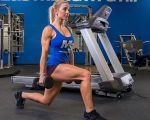Nutrition Plans for Muscle Recovery: Essential Foods for Faster Healing
As someone who has been active in sports and fitness for many years, I know firsthand how crucial proper nutrition is for muscle recovery. After an intense workout or a long run, the recovery process becomes just as important as the workout itself. I have personally discovered that following a well-balanced nutrition plan can significantly speed up muscle recovery, reduce soreness, and even enhance performance in the long term. In this article, I will share some key strategies and nutrition tips to help you optimize your muscle recovery.
1. The Role of Nutrition in Muscle Recovery
When we push our muscles during a workout, tiny tears occur in muscle fibers, which need proper nutrition to repair and grow. Without the right foods, our muscles may not recover efficiently, and we could experience longer recovery times or even injuries. For muscle recovery, the two primary nutrients we focus on are protein and carbohydrates, but fats and hydration also play important roles. Let me walk you through the essentials of muscle recovery nutrition and how you can structure your meals to help you bounce back faster.
1.1 Protein: The Building Block of Muscle Recovery
Protein is probably the most well-known nutrient for muscle recovery, and for good reason. It helps repair the tiny muscle tears caused by exercise. I always make sure to include a good source of protein in my post-workout meals. Foods like chicken, turkey, fish, eggs, and plant-based sources like tofu or lentils are excellent choices. One of my personal favorites is a chicken breast with quinoa or brown rice, which provides both protein and complex carbs. Aim for about 20-30 grams of protein within 30 minutes to two hours after exercise to maximize muscle repair.
1.2 Carbohydrates: Replenishing Glycogen Stores
After a workout, your body also needs to replenish its glycogen stores, which are depleted during exercise. Carbohydrates are the best fuel for this. I often pair my protein with a complex carb, like sweet potatoes, oats, or whole grain pasta. This not only helps restore glycogen but also provides a steady release of energy throughout the day. The timing of carbohydrate consumption can be crucial, and I’ve found that consuming carbs within two hours post-workout gives the best results in terms of muscle recovery and energy levels.
2. Best Foods for Muscle Recovery
While protein and carbs are essential, there are several other foods that can help accelerate muscle recovery. Here are some of my go-to foods that I include in my diet regularly to support my muscle repair process.
2.1 Fatty Fish for Omega-3 Fatty Acids
Fatty fish like salmon, tuna, and sardines are packed with omega-3 fatty acids, which are known to reduce inflammation in the body. Inflammation is often a major cause of soreness after a tough workout. I try to incorporate fatty fish into my meals at least twice a week. Besides reducing inflammation, omega-3s help improve blood flow, which speeds up the delivery of nutrients to muscles for repair.
2.2 Antioxidant-Rich Fruits and Vegetables
Eating a variety of colorful fruits and vegetables provides antioxidants, which help reduce oxidative stress caused by intense exercise. I make sure to include dark leafy greens like spinach and kale, as well as berries like blueberries and strawberries in my meals. These foods not only help with recovery but also contribute to overall health. The antioxidants in these foods are key to reducing muscle soreness and preventing muscle damage in the long run.
2.3 Hydration: Water and Electrolytes
One thing I cannot stress enough is the importance of staying hydrated. I learned early on that dehydration can delay muscle recovery and lead to cramping. After a workout, I drink water or an electrolyte-replenishing drink to ensure my body has the fluids and minerals it needs to recover. I also like to add coconut water to my routine, as it’s packed with natural electrolytes and is a great way to stay hydrated without any added sugar.
3. Supplements to Boost Muscle Recovery
While whole foods should be your primary source of nutrients, supplements can also play a role in speeding up recovery. Some supplements are backed by research to help with muscle repair and soreness reduction. I’ve personally used a few of these to help me recover faster and more effectively.
3.1 Creatine for Muscle Repair and Strength
Creatine is a popular supplement among athletes because it helps to increase strength, improve performance, and support muscle repair. I’ve used creatine for several years and found that it significantly helps with muscle recovery, especially after high-intensity workouts. Creatine also helps with hydration by pulling water into your muscles, which improves recovery time. Typically, I take creatine before or after a workout to maximize its benefits.
3.2 Branched-Chain Amino Acids (BCAAs)
BCAAs, which include leucine, isoleucine, and valine, are essential amino acids that promote muscle repair and reduce soreness. I’ve noticed a decrease in muscle soreness after incorporating BCAA supplements into my routine. They can be taken pre-workout, during a workout, or post-workout, depending on your preference. BCAAs help to prevent muscle breakdown, especially during long or intense training sessions.
3.3 Glutamine for Immune Support
Glutamine is an amino acid that plays a key role in muscle recovery by supporting the immune system. After intense exercise, my immune system can sometimes take a hit, so I add glutamine to my supplement regimen to help speed up recovery and boost my immunity. It also helps with protein synthesis, which aids in the repair and building of muscle tissues.
4. Timing Your Nutrition for Maximum Recovery
When it comes to muscle recovery, timing can be just as important as the food itself. I’ve learned that eating the right foods at the right time is crucial for optimal recovery. The most important window is the post-workout period, where your muscles are most receptive to nutrients. I aim to eat a balanced meal containing protein and carbohydrates within an hour or two of finishing my workout. This timing helps to maximize muscle protein synthesis and accelerate recovery.
4.1 Pre-Workout Nutrition
Pre-workout nutrition is also important to ensure your muscles have the energy they need to perform well during a workout. A small snack that includes carbohydrates and a bit of protein can provide the energy needed for optimal performance. I often have a banana with peanut butter or a small smoothie before my workout to fuel up properly.








